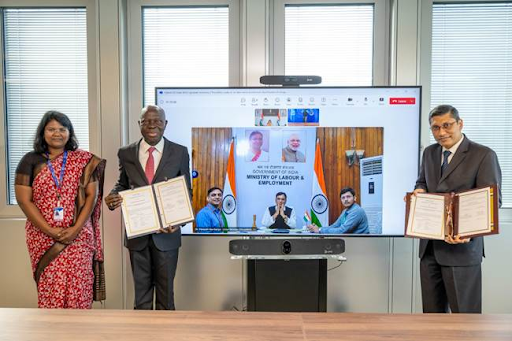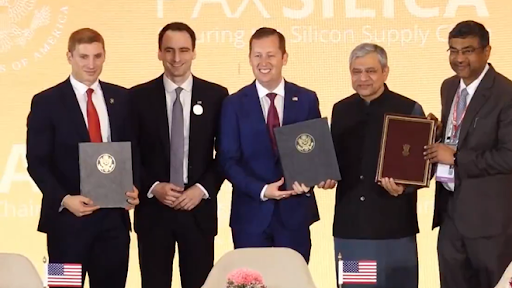



India and the ILO signed an MoU on the International Reference Classification of Occupations to bridge global skill gaps, boost youth access to overseas jobs, enable skill recognition, and conduct sectoral studies in green, digital, and care economies.

Copyright infringement not intended
Picture Courtesy: PIB
The Government of India signed a Memorandum of Understanding (MoU) with the International Labour Organisation (ILO) to collaborate on developing the 'International Reference Classification of Occupations' (IRCO).
The ILO is a specialized UN agency dedicated to promoting social justice, decent work, and international labour standards.
History of the International Labour Organisation
Founding: Established in 1919 under the Treaty of Versailles post-WWI, recognizing labour peace as essential to global stability.
UN Integration: Became a UN specialized agency in 1946; joined the UN Development Group to advance SDGs, especially SDG 8 (decent work and economic growth).
Evolution: Pioneered conventions like the 8 core labour standards; adapted to modern challenges like digitalization and climate impacts on employment.
Functions of the International Labour Organisation
Policy Formulation: Develops international labour standards (189 conventions, 206 recommendations) on rights, wages, and safety; supervises implementation via reports and committees.
Technical Cooperation: Provides assistance to member states for policy adoption, including skills training and employment promotion.
Research and Capacity Building: Conducts global studies (e.g., World Employment and Social Outlook); offers training and education to enhance labour market resilience.
Global Advocacy: Promotes tripartite dialogue; supports SDGs through initiatives like the Global Coalition for Social Justice.
Signatories: Signed in Geneva by Arindam Bagchi (India's Ambassador to UN/ILO) and Gilbert F. Houngbo (ILO Director-General).
Scope: Focuses on feasibility study and pilot in green, digital, and care sectors using AI and big data for harmonizing occupational taxonomies.
Timeline: Builds on G20 Delhi Declaration (2023) endorsing IRCO by skill/qualification levels; initial pact for study, with potential for broader collaboration.
Framework: Enhances data comparability, mutual skill recognition, and labour market efficiency; integrates with India's digital platforms like NCS and e-Shram.
IRCO is an ILO-developed framework classifying occupations based on tasks, duties, skill levels, and qualifications, serving as a global standard for labour statistics.
Purpose: Enables cross-country data comparison for migration, training, and policy-making; current version updated to include emerging jobs in digital/green economies.
Structure: 10 major groups (e.g., managers, professionals) subdivided by skill (1-4 levels); aligns with national systems like India's National Classification of Occupations.
Relevance: Addresses 21st-century shifts like automation; supports SDG 4 (quality education) and SDG 8 by standardizing credentials for 1.5 billion global workers.
Source: PIB
|
PRACTICE QUESTION Q. Digitalization and the green economy are key sectors for future employment. Critically analyze. 150 words |
The ILO is a specialized UN agency founded in 1919 that sets international labour standards, promotes decent work, and advances social justice. It is unique for its tripartite structure involving governments, employers, and workers.
The ILO headquarters is in Geneva, Switzerland. It currently has 187 member states, including India, making it one of the largest UN agencies in terms of membership.
The ILO follows a tripartite governance model, where representatives of governments, employers, and workers jointly make decisions. This ensures balanced perspectives on labour issues.




© 2026 iasgyan. All right reserved